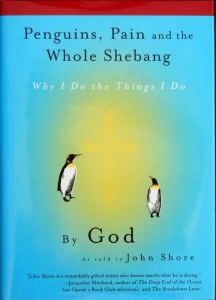This is a continuation of the conversation begun in my last post, Leaving Christianity is going viral.
I had a sudden conversion experience, out of freakin’ nowhere, when I was thirty-eight years old. The microsecond before it happened, I couldn’t possibly have been less of a Christian. To quote from the afterward of the book of mine that I’m about to quote a lot more from:
If anything, I was anti-Christian. The religion struck me as ridiculously immature, a way-too-obvious system designed mostly to capitalize on people’s guilt: Big Daddy in the Sky knows you did wrong, but will love you anyway, if you’ll only admit that he’s perfection itself, and that you’re a wretched, sickening sack of sin.
Please. I always figured that if I wanted Father Knows Best, I’d watch TV.
At the time I was the executive editor of a biweekly music tabloid here in San Diego. I was also writing a novel.
Soon after my conversion I was suddenly moved to stop writing my novel, and to instead pen a short book called “Penguins, Pain and the Whole Shebang: Why I Do the Things I Do,” by God (as told to John Shore). Purely as a literary device (one to which I had no idea anyone would object—especially given that for 500 years Christians considered their second Bible The Imitation of Christ by Tomas à Kempis [the best translation of which I believe to be the one by William Creasy], which consists of Kempis putting words in the mouth of Jesus), in Penguins I had God himself,* in his own voice, directly answer the dozen or so objections and/or questions about Christianity that I knew most vex non-Christians (have just been one myself for thirty-eight years). Those questions and objections are expressed in the book’s Table of Contents:
I just don’t believe in God, period.
If you really exist, why don’t you prove it?
What’s the deal with evil, anyway? Why does a God who is all-powerful and all-compassionate allow evil to exist? He either wills evil to exist — which makes him despicable — or he’s powerless to stop it, which makes him uninspiringly weak, to say the least. Both bite. What’s up?
Why are so many Christians so obnoxious and mean-spirited? It seems like Christianity’s mostly about being judgmental, narrow-minded, and having an infuriatingly condescending attitude toward anyone who isn’t a Christian. Christians are so busy being smug about being Christian that they forget to be kind.
What’s that whole “Atonement” thing actually mean?
Isn’t it enough that I believe in God? Why do I have to narrow it down to the Christian God?
What’s the deal about God actually writing the Bible? Is it written by God, or people, or people filled with the Holy Spirit, which is somehow supposed to be the same as God, or what? What’s the Scoop, Jackson?
Even if I do believe in Christ, do I really have to go to church every Sunday? Yuck.
So how would being a Christian actually improve my life? What would it really do for me?
There’s more to the book than that—its opening scene (“The Conversation John Overheard”) was once performed at the San Diego Repertory Theater—but “God’s” answers to the questions above are the lion’s share of its content.
Penguins was the answer to my desire to have something short, deep and funny that I could give to my non-Christians friends, relatives and associates by way of proving that just because a person is Christian doesn’t automatically mean that they’re also irrational.
After an unbelievable journey through the shark-infested world of Christian book publishing (I especially liked it when the president of a huge Christian publishing house told me that it was “blasphemous” to even suggest that God has a sense of humor; I liked it less when the whole idea of the book [including its format and tone] was stolen from me and given to another author because I wasn’t famous enough), Penguins was chosen as the flagship title to launch the return of Seabury Books, the venerable but by then long dormant imprint of the Episcopal publisher, Church Publishing, of New York City. (John Shelby Spong’s first books were published by Seabury.) Penguins is the first book that Church Publishing, founded in 1918, ever paid a penny to publish: $5,000. (I’ve since reacquired all rights to the book.)
The first thing I ever wrote about Christianity, Penguins comprises the core of everything I’ve written about it since. (I was pleased when it won the 2006 San Diego Book Award for Best Book: Religion/Spirituality.)
So, back to the primary concern we were/are dealing with relative to Leaving Christianity is going viral. Below is how, in Penguins, I have God himself answer the question: Why are so many Christians so obnoxious and mean-spirited?
Oh, come on, now [says God]—don’t you think that’s a little harsh?
After all, remember: Christians aren’t perfect; they’re just forgiven.
So they’re only imperfect for, like, brief moments at a time.
And then they’re better than you again.
No, but seriously, if the above statement reflects your own sentiments, then when you die I am going to snatch you right up into heaven and give you a seat right next to mine. Because verily I say unto you: You have been doinked.
It pains me beyond anything I could possibly express to say that I understand how you came by your impression of Christianity. That you feel this way is a shame, in the most profound sense of that word. All the Christians you’ve ever spent any time with at all should have deeply impressed you with their great, fun character. That that didn’t happen is as wrong as wrong gets.
You may also, I know, feel negatively toward Christianity because you’re aware of the ways throughout history that Christians have behaved abominably.
But, for now, let’s say that your agreement with the opening statement has less to do with your dissatisfaction with Christianity’s history than it does with your dissatisfaction with a lot of the Christians you’ve met. Even if you knew that five hundred years ago, in my name, the Spanish Inquisition committed unthinkable atrocities to an unthinkable number of people, or that three hundred years ago Christian missionaries responded to the love and open arms of the people welcoming them to the New World by starving and beating them into submission, if the only Christians you’d ever met were deeply ashamed of the less-then-peachy aspects of their faith’s history and were themselves open, thoughtful, admirable people, you’d feel better about Christianity in general, right?
Right.
But, instead, you’ve met the dreaded, despicable Bad Christians.
Man. Just thinking about the BCs gives me the fantods.
Please allow me, right off the bat, to grant you this: Christians (or at least people who think or say they’re Christians) are just about the only people in the world who will screw you till you bleed, and then tell you it was for your own good. Most people just hammer you and go on their way: You’re an incidental victim in the vast minefield of their obnoxiousness. But Christians will tell you they slammed you to the ground like a flaming bag of swamp peat so that you could learn something about being more pleasing to me, or to help rid you of sin, or some other nonsense that makes me want to reach out of the sky and clamp those offensive prigs and just hold them there while they rethink the purpose of their life.
Man, that stuff drives me crazy.
Trust me: If I want to teach you something, I will. Nothing in this universe angers me like someone doing anyone any kind of harm in my name. Any kind of harm. I hate it more than anything I know.
I mean, imagine how Walt Disney would feel if bands of marauding Mickeys were going around mugging and beating people, while saying, “Walt wants you to suffer! Walt wants you to die! We’re breaking your legs cuz that’s what Walt wants!”
You’d be lying on the ground going, “I hate Walt Disney. Help!”
See? Not good for Walt; not good for you; not good for Disneyland.
On the other hand, though, we do have to be fair. You feel the way you do about Christians because of the Christians you’ve met, right? But, being Reasonable Types, you are obliged to acknowledge that in your life you’ve also met a bunch of really good people who are Christian: kind, thoughtful, patient, strong, funny, smart, normal people. There’s just no way for you to have met a lot of offensive Christians without having also met at least an equal number of people who clearly and consistently rocketh.
(Um . . . this is assuming that you live in a place where you’ve necessarily met or known a wide range of people who think of themselves as Christian. But of course I understand how it might be that if you live in, say, a remote little village in a distinctly non-Christian country, and the only Christians you’ve ever met are missionaries who’ve apparently vowed not to rest until every last one of the “natives” in the area signs a statement declaring their own genitals to be Public Enemy No. 1, then you might be something less than thrilled about the whole “Let’s Be Christians” thing. I understand that — and, again, please allow me to apologize for those people. If you really have only ever met Bad Christians, then, as I say, I’ll be sure to save you a seat.)
But if you live around many Christians, then you must agree that you’ve known or heard about some good ones, just as you’ve known (or heard about) some bad. It’s true enough that you can barely throw a rock without hitting some kind of soup kitchen, hospital, senior housing project, or Rescue Mission founded or being run by Christians.
Here’s the thing: It’s the Dreaded BCs who get all the attention. Everyone looks at the guy who starts screaming at the bus stop. Nobody pays any attention to the person who’s just quietly sitting there, waiting for a bus (and maybe praying for the screaming psycho). Real Christians, people who genuinely Get It, are grounded, sane human beings who take care of their business — who love their family, love me, and try their best to leave the world a better place than they found it. They’re not on TV, raving about the sins of this or the sins of that. They’re not trying to finagle little old ladies into sending them all their money. They’re not standing on a street corner screaming at passersby about how they’re going to hell. Of course you see those guys. Everybody sees those guys. I sure see them — and they make me cringe, every time.
And what the more, shall we say, attention-generating Christians sometimes miss, is that they have absolutely no more access to me than your brain and heart afford you. I don’t care how large a following someone has, or how gargantuan a person’s church, ranch, or hair is: There’s no Boss Of The Christians. (Um . . . except me. And, sorry to say, business is down — so you’re fired. Sorry! As a severance package, we’re going to let you keep your company calendar. Ha! Just kidding! Now get back to work.)
The point is that there are hypocritical, judgmental creepazoids everywhere, in every kind of group or class you can think of. You get more than three people together, and it’s a safe bet you’ll barely be able to stand two of them. That’s just life. So, yeah, some Christians need to be taken out into a field and pushed into a ditch — but so what? That doesn’t mean Christianity is bad, any more than a broken pencil means writing or drawing is bad. They’re simply unrelated.
Some people are immature. Some aren’t. If you found a pebble in a bag of beans, you wouldn’t assume all the beans are rocks. You’d throw the rock out — and get on preparing the beans. (Mmmm . . . beans.) No problem.
Plus, always remember: Ultimate Justice is a huge part of what I do. In other words, rest assured that as surely as meanies get fewer cards on Valentine’s Day, I will take care of the Offensive Ones. Life will take care of them.
That’s an inherent characteristic of the system in which you live. The strident “Christians,” for instance, who offend you with that weak Holier Than Thou nonsense, are in pain. They’re not happy, they’re not balanced, things don’t go their way. Nobody sends them valentines.
The truth (as you know) is that you should feel sorry for the people who seem like they could give a hang whether you feel sorry for them or not. Because as awful as it is being around an obnoxious, nasty person, it’s infinitely better than being an obnoxious, nasty person.
It’s the wounded animals who bite the hardest.
Anyway, the Bad Christians will be all right. They’ll get it. If they keep praying, meditating, going to church, and hanging out with good Christians, they’ll smooth out.
You don’t have to worry about them, in other words. Your heart, right now, tells you what is right. If people who claim to be Christians rub you the wrong way, ignore them — and assume they rub me the wrong way, too. (You can also assume that I have a broader view of them than you do. I know all kinds of things about them you couldn’t possibly. You see the effect of their pain; I see its cause. So I’ll naturally have a slightly more compassionate view of them than you’re likely to. But still! No excuses for them!)
Listen, the entire point of Christianity is that people are supposed to love each other. That’s its purpose. The whole Christian Program goes like this: I came down; I absorbed into my body all the guilt that anyone could ever cause or feel (since guilt is the thing that interferes with love, and so Must Go); as a symbol of my For All Time eradication of that guilt I let be killed the body that held it; the entire time I was down there I made it as clear as I possibly could that the whole reason for my coming and doing that was so that people would actually believe it had really and truly happened; believing in the reality of my sacrifice establishes the means by which any person, anywhere in the world, at any time in their life, can, by appealing to me and my experience on the cross, have lifted from them any amount of guilt, so that once again they’ll be free to love themselves as, Me knows, I do, and can then go back out into the world, filled with nothing but love, love, love.
The End.
That’s it. That’s The Plan. Most get it; some don’t; some do on Thursday, but then forget it on Saturday.
Let’s make a deal: You don’t judge Christianity by the weenie Christians you know, and I won’t judge your whole life by those few and far between times when you aren’t exactly at your best, either.
See? We’ll look past the negative. We’ll believe in something better.
We’ll forgive.
* As I was just explaining to a friend on Facebook who objected to my using for God the male pronoun: When I wrote this book I was so new to Christianity that I didn’t think anyone—ever, anywhere—seriously thought that God possessed male genitalia. I just assumed everyone understood that referring to God as “he” was just a lame but accepted convention of the English language, not an … actual assignment of gender. Then I … began to learn all the great many ways in which Christianity has been so tweaked it’s a wonder it’s still around at all. (For my second book, I was shocked to be told that not only must God be referred to in the masculine, I would not be allowed to even suggest otherwise, an experience I wrote a bit about in my post Must God Be a He-Man? Of course, much later, when I wrote the tenets for the group Unfundamentalist Christians, I included as number six of the fourteen, “Using masculine pronouns to refer to God is strictly a matter of convention, a profoundly unfortunate necessity of the English language, which to date offers no satisfactory alternative. But God is neither male nor female. God is always, at once, both and unimaginably more.”

Penguins, Pain and the Whole Shebang: Why I Do the Things I Do, by God (as told to John Shore)
Hardcover | Kindle edition | NookBook edition
Direct from author, autographed and inscribed according to your directions














